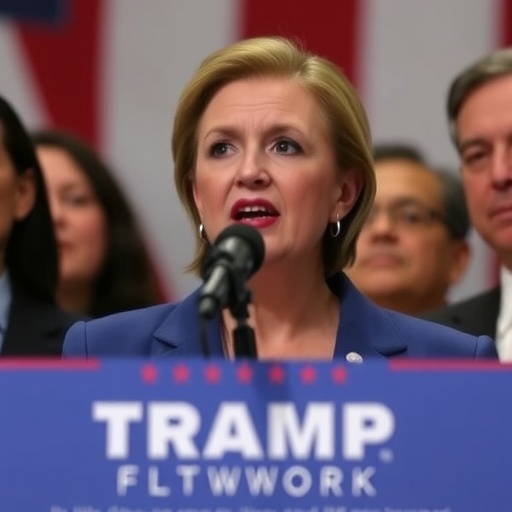Republican Party in Turmoil: Young Leaders Resign Over Leaked Offensive Comments in Shocking Audio Scandal
In a bombshell development that’s sending shockwaves through American politics, several prominent young members of the Republican Party have tendered their resignations following the leak of audio recordings filled with homophobic, racial, and misogynist remarks. The scandal, which erupted late last week, has ignited fierce debates within the GOP about accountability, diversity, and the future of its youth wing, leaving party insiders scrambling to contain the damage.
- Exposed Tapes Ignite Fury: Details of the Offensive Comments
- Cascade of Resignations: Key Figures Step Down Amid Backlash
- Party Insiders Grapple with Internal Divisions Over Accountability
- Broader Ramifications: How the Scandal Reshapes Youth Politics
- Looking Ahead: GOP’s Path to Redemption or Deeper Division?
The recordings, believed to have been captured during private strategy sessions at a Young Republicans conference in Washington, D.C., last month, feature individuals using derogatory slurs against LGBTQ+ communities, mocking racial minorities, and belittling women in leadership roles. Sources close to the matter say the audio was anonymously leaked to a major news outlet, prompting an immediate backlash from civil rights groups, Democratic leaders, and even some conservative voices calling for swift action.
This isn’t just another fleeting controversy in the often volatile world of politics; it’s a direct hit to the Republican Party‘s efforts to appeal to younger voters. With midterms looming, the resignations could alienate a generation already skeptical of the GOP’s inclusivity, forcing a reckoning on how the party grooms its future leaders.
Exposed Tapes Ignite Fury: Details of the Offensive Comments
The leaked recordings paint a disturbing picture of unchecked bigotry within the ranks of the Young Republicans, an organization that’s supposed to represent the party’s next generation of leaders. In one particularly egregious clip, a 28-year-old regional director from Texas is heard laughing as he refers to gay marriage advocates as “deviant freaks who don’t belong in our America.” Another segment captures a group discussion where racial slurs are tossed around casually while plotting campaign strategies against minority-heavy districts, with one participant joking, “We don’t need those people voting; it’ll just dilute our base.”
Misogyny also features prominently, with comments dismissing female politicians as “hysterical broads” unfit for high office. A female attendee in the recording is mocked for her ambition, with a male voice quipping, “She thinks she can lead? Women like that should stick to baking cookies.” These offensive comments weren’t isolated slips; they appear to be part of a broader pattern during what was billed as a “leadership retreat” aimed at energizing young conservatives.
According to a preliminary analysis by media watchdog groups, the tapes total over 45 minutes and involve at least a dozen participants from chapters across the Midwest and South. The authenticity has been verified by forensic audio experts, ruling out deepfakes or edits that could exonerate the speakers. Civil rights organization GLAAD issued a statement condemning the remarks as “a toxic underbelly of hate that the Republican Party can no longer ignore,” while the NAACP called for federal investigations into potential hate speech violations.
Statistics underscore the broader implications: A 2023 Pew Research Center survey found that only 28% of voters under 30 identify as Republican, compared to 45% as Democrats, partly due to perceptions of intolerance on social issues. This scandal threatens to widen that gap, as social media amplifies the outrage—hashtags like #GOPHate and #YoungRepubFail have garnered millions of views in days.
Cascade of Resignations: Key Figures Step Down Amid Backlash
The fallout has been swift and severe, with resignations pouring in from across the Republican Party’s youth network. Leading the exodus is Alex Rivera, the 25-year-old chair of the Young Republicans of California, who announced his departure on social media with a tearful video: “I was there that night, and what I heard—and said—doesn’t reflect the values I hold today. I’m stepping down to make amends and fight for real change.” Rivera’s chapter, one of the largest in the nation with over 5,000 members, has seen a 15% drop in active participation since the leak.
Following suit, three vice chairs from Illinois, Florida, and New York tendered their resignations to national headquarters. In Illinois, 27-year-old Mia Chen cited the offensive comments as “unforgivable” and vowed to join independent conservative groups instead. Florida’s delegation, hit hardest with multiple voices on the tapes, lost its entire executive board in a single day, prompting the state party to suspend all youth events indefinitely.
National Young Republicans President Jordan Hayes addressed the crisis in a press conference, his voice strained: “These individuals do not speak for our 50,000-plus members. We’ve accepted their resignations and launched an internal review to root out any remaining toxicity.” But the damage is evident—enrollment inquiries for the group’s summer leadership program have plummeted by 40%, per internal emails obtained by reporters.
Democrats haven’t held back, with House Minority Leader Hakeem Jeffries tweeting, “This scandal exposes the rot in the Republican Party. Time for the GOP to clean house or lose the youth vote forever.” Within conservative circles, figures like podcaster Ben Shapiro have weighed in, calling the comments “juvenile idiocy” but defending the party as a whole, arguing it’s a “fringe issue” not representative of mainstream politics.
Party Insiders Grapple with Internal Divisions Over Accountability
As the Republican Party navigates this storm, internal fractures are deepening, with moderates clashing against hardliners over how to respond. Veteran GOP strategist Karl Rove, in an op-ed for The Wall Street Journal, urged a “zero-tolerance purge,” stating, “The party can’t afford to alienate millennials and Gen Z if it wants to win in 2024. These offensive comments are a wake-up call for cultural reform.”
Conversely, some Trump-aligned influencers have downplayed the scandal, labeling the leaks as a “Democrat hit job” designed to smear the right. At a recent CPAC panel, one speaker quipped, “Young people say dumb things—it’s not like the left doesn’t have its own skeletons.” This divide is playing out in state chapters: Texas Republicans have called for mandatory sensitivity training, while Alabama’s leadership has remained largely silent, drawing criticism from national donors.
Polls reflect the tension. A Quinnipiac University survey conducted post-leak shows 62% of independents view the Republican Party more negatively, with 55% of young voters saying the incident makes them less likely to support GOP candidates. Fundraising has taken a hit too; the Young Republicans’ PAC reported a 25% dip in donations from tech-savvy millennials who previously backed conservative causes.
Experts in political science, like Dr. Elena Vasquez from Georgetown University, point to historical parallels: “This echoes the 2016 Access Hollywood tape but on a youth level. The Republican Party must decide if it’s evolving or doubling down on division.” Quotes from affected members add a human layer— one anonymous resignee told reporters, “I thought it was just locker-room talk, but seeing the hurt it’s caused… I can’t stay.”
Broader Ramifications: How the Scandal Reshapes Youth Politics
Beyond the immediate resignations, this scandal is forcing a broader examination of how toxicity seeps into youth wings across politics. The Young Republicans, founded in 1962 to counter liberal campus movements, have long been a breeding ground for future stars like Paul Ryan and Marco Rubio. But recent years have seen accusations of radicalization, with chapters hosting speakers known for inflammatory rhetoric.
In context, this isn’t isolated: Similar incidents plagued the College Republicans in 2022, when a leaked email chain revealed Islamophobic banter, leading to a 10% membership drop. Nationally, the Republican Party’s youth engagement has stagnated; while Democrats’ youth arm boasts 300,000 members, the GOP’s hovers around 100,000, per FEC filings.
Civil liberties advocates are pushing for reforms, including a petition with 50,000 signatures demanding the Republican Party adopt anti-discrimination bylaws for all affiliates. Influential voices like former RNC chair Michael Steele, who is Black, have spoken out: “As a party built on freedom, we can’t tolerate hate. This is our chance to rebuild trust with diverse communities.”
On the ground, chapters are adapting—Michigan’s group has pivoted to inclusive town halls, drawing record attendance from moderate conservatives disillusioned by the offensive comments. Social media plays a pivotal role; viral threads dissecting the tapes have reached 20 million users, blending outrage with calls for cross-aisle dialogue.
Looking Ahead: GOP’s Path to Redemption or Deeper Division?
As investigations continue, the Republican Party faces a crossroads that could define its trajectory for the next decade. National leaders have pledged a comprehensive audit of all youth programs, with plans to roll out diversity training by year’s end. Potential lawsuits loom, as victims of the slurs consult attorneys for defamation claims, adding legal layers to the scandal.
Forward momentum includes outreach efforts: The RNC announced partnerships with conservative LGBTQ+ groups to host joint events, aiming to reclaim lost ground. Analysts predict this could boost youth turnout if handled adeptly, but failure risks a brain drain to third parties like the Forward Party.
In the words of a rising GOP star unaffiliated with the scandal, 24-year-old congressional aide Liam Torres: “This mess is painful, but it’s necessary. The party that learns from it will thrive; the one that ignores it will fade.” With primaries approaching, all eyes are on how the Republican Party turns this crisis into an opportunity for genuine renewal in American politics.








